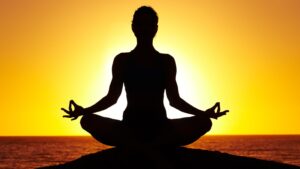 Life is growing ever faster in our modern world, and we are losing touch with our true inner peace and power. When we no longer feel grounded, we can experience ourselves pushed and pulled in many different directions. At this point, we start to experience stress and a feeling of being trapped. Gradually, over time, this feeling leads to illness and disease, as our mental, emotional and physical health is thrown out of balance.
Life is growing ever faster in our modern world, and we are losing touch with our true inner peace and power. When we no longer feel grounded, we can experience ourselves pushed and pulled in many different directions. At this point, we start to experience stress and a feeling of being trapped. Gradually, over time, this feeling leads to illness and disease, as our mental, emotional and physical health is thrown out of balance.
Meditation is the journey inwards, a journey of self-discovery or, in fact, re-discovery. It is time taken for quiet reflection and silence away from the hustle and bustle of daily life. Taking time out enables us to come back to a centred place of being.
Story: Mountain, Monk and Wind (Source: Internet)
A wise old monk lived atop a mountain where the wind howled fiercely every day. Travellers often asked how he managed to meditate with such noise.
 The monk explained, “At first, I struggled against the wind. I cursed it for disturbing my peace. But then, I stopped fighting it and became one with the sound. Now, I hear the wind, but it no longer disturbs me. I am at peace, no matter what happens outside.”
The monk explained, “At first, I struggled against the wind. I cursed it for disturbing my peace. But then, I stopped fighting it and became one with the sound. Now, I hear the wind, but it no longer disturbs me. I am at peace, no matter what happens outside.”
Moral of the Story:
Meditation teaches us to accept the external world without letting it disturb our inner peace.
What is Meditation?
In the present time, networking is very important. Business gurus give much importance to networking. We try to build relationships with many thinking that when I need them, I can connect with them.
What about networking with ourselves? How often do we network with ourselves? How often do we spend time with ourselves and try to find out what is happening inside?
The essence of meditation is not something we do; rather, it is simply to be, fully present and aligned with life in the moment.
Meditation is not concentration; it’s not sleep. Meditation is a conscious state of rest. Meditation is effortless. Meditation helps us explore our spirit, the deep silence within, and our vastness.
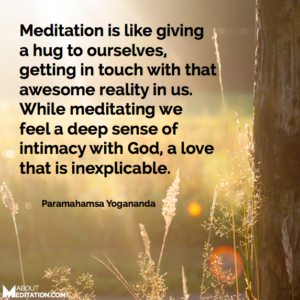 Meditation lets you become more aware and more purposeful about your actions. It teaches you how to respond, rather than react, to situations in your life. Meditation improves the ability to think, concentrate and solve problems and enhances the ability to adapt to and overcome emotional problems.
Meditation lets you become more aware and more purposeful about your actions. It teaches you how to respond, rather than react, to situations in your life. Meditation improves the ability to think, concentrate and solve problems and enhances the ability to adapt to and overcome emotional problems.
Why to Meditate?
Our state of mind is dependent on others. When others speak politely, we feel good. When they speak badly, we feel bad. We give credit for our state of mind to others. We don’t take ownership of our state of mind. Like, if a colleague has a cough and cold and comes to the office. Does everyone get infected? The answer is No. But, if we get infected, we blame our colleagues rather than our low immunity. If we can improve our immunity, we can remain unimpacted. Meditation is a way to improve our immunity.
The need to meditate is present in every human because everyone desires a joy that never diminishes, a love that is eternal and free of distortions. Some of the key reasons to meditate are.
- Brings Deep Relaxation and Clarity: When the river is calm, the reflection is clearer. Similarly, when the mind is calm, there is greater clarity in the expression field. Regular practice of meditation helps attain a deep state of relaxation and peace. And this peacefulness often lasts, far beyond the meditation itself.
- Leads To Positive Vibrations: Each one of us has a unique vibration and these vibrations are affected when we are stressed, angry, upset or frustrated. Meditation holds the key to change and makes these vibrations positive and productive, leading to clarity in thoughts and emotions. It helps to clear the impressions in our mind and focus and redirect our thoughts to achieve a mentally clear and emotionally stable state.
- More Powerful than Sleep: Meditation and sleep both give deep rest. However, the quality of rest from meditation is deeper. The amount of energy that we get from meditation is much more than sleep. Meditation gives you rest, deeper than the deepest sleep. By doing meditation, we can
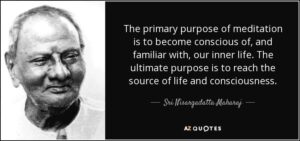 turn our body into a powerhouse by generating an inner source of energy.
turn our body into a powerhouse by generating an inner source of energy. - Increases Energy Levels: Anxiety, worry and stress can be more than distractions. Daily problems and fears can hurt your mental and physical health. Meditation is known to increase the energy level in the body. And as the prana level increases, anxiety automatically decreases. Hence symptoms of depression, anxiety or post-traumatic stress disorder have reportedly shown improvement with regular meditation.
How to Meditate
As parents, we expect our teenage children to discuss before making any decision. The objective is not to deprive them of making decisions but to help them to make the right decision. Something similar is with meditation too. Often, we are not sure about making a particular decision. We try to talk to different people and take their advice. Many times, even after that we do not feel confident and clear about taking any decision. But when we spend time with ourselves like morning walks, swimming, jogging, yoga etc., we can find the right answer.
Self-awareness is a stepping stone to meditation, which is the step of merging with the background, and the consciousness within. Meditation is not relinquishing one’s intelligence. It is consciously using intelligence to know the difference between illusions and reality and eventually going beyond limited intelligence to tap into the intuitive source of knowledge.
Meditation is not escaping into an inner world, disconnecting from others and isolating oneself. This is a very important point, as people resort to meditation to escape from pain in the dual world of imperfections without doing anything to bring back balance and purity to the mind.
So conscious breathing, conscious concentration, conscious relaxation, and a steady pose will bring you to the state of meditation. Some simple guidelines are as follows.
- Start Small: Begin with short sessions, 5-10 minutes, and gradually increase the time as you get comfortable.
- Use Guided Meditations: If you’re new to meditation, using a guided meditation app or video can be helpful to maintain focus and structure.
- Practice Consistently: Like any skill, meditation becomes more effective with regular practice. Consistency is key to experiencing long-term benefits.
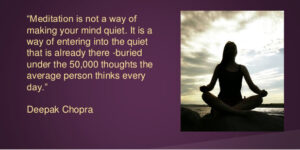 Conclusion:
Conclusion:
Meditation is a practice of focusing the mind and cultivating a state of calm awareness. It often involves techniques such as mindfulness, deep breathing, visualization, or concentration on a specific thought or object. The goal is to achieve mental clarity, emotional balance, and a sense of inner peace. Meditation has roots in spiritual traditions but is now widely recognized for its benefits in mental and physical well-being.
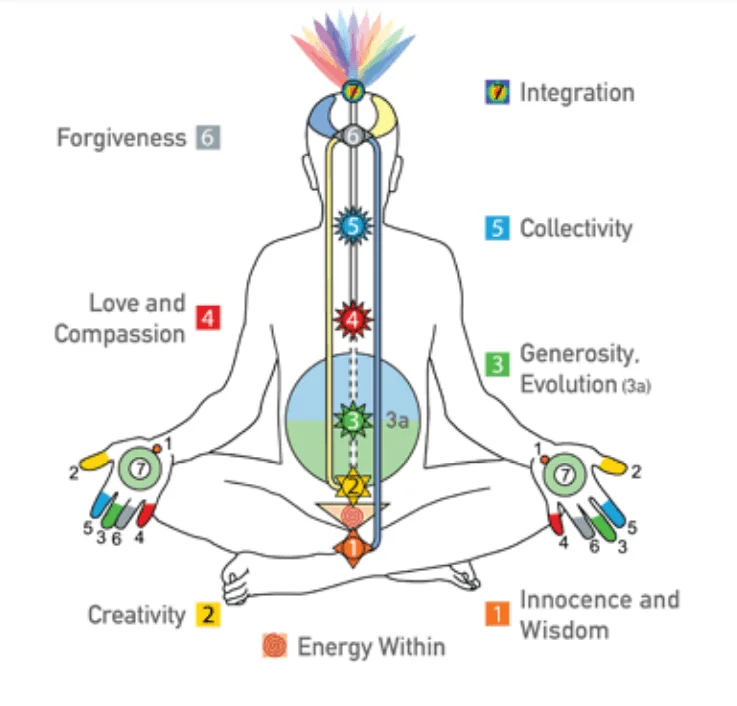
Leave a Reply
You must be logged in to post a comment.